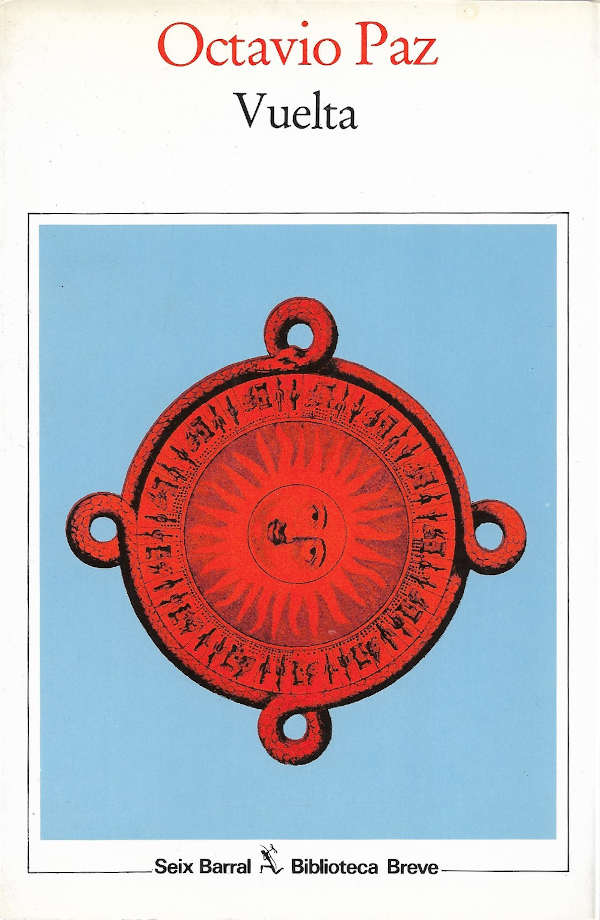
Recoge poemas escritos por Octavio Paz después de Ladera Este (1962-1968). El título de este nuevo conjunto de poemas alude al regreso de Paz a México, después de una larga ausencia en Oriente y Europa. El libro está formado por cuatro poemas extensos, unidos por el tema común dela vuelta a la ciudad natal, y otros más breves. Entre estos últimos algunos son homenajes a poetas y artistas amigos, y los demás, pequeñas instantáneas verbales con las que el poeta no se propone tanto inmovilizar un momento o una experiencia como reproducirlos, animarlos sobre la página. Los cuatro poemas extensos son: Vuelta o la ciudad y sus fantasmas; A la mitad de esta frase o la ciudad y sus muertos; Petrificada petrificante o la ciudad y sus ideologías feroces, las ideas vueltas ídolos sanguinarios; Nocturno de San Ildefonso o los sueños y delirios de la juventud y la visión de la noche. Cuatro poemas inmersos en la historia de México como en la historia personal del autor. El libro que muchos amantes de la literatura recuerdan con gran admiración.
Octavio Paz was born in 1914 in Mexico City. On his father’s side, his grandfather was a prominent liberal intellectual and one of the first authors to write a novel with an expressly Indian theme. Thanks to his grandfather’s extensive library, Paz came into early contact with literature. Like his grandfather, his father was also an active political journalist who, together with other progressive intellectuals, joined the agrarian uprisings led by Emiliano Zapata. Paz is a poet and an essayist. His poetic corpus is nourished by the belief that poetry constitutes “the secret religion of the modern age.” Eliot Weinberger has written that, for Paz, “the revolution of the word is the revolution of the world, and that both cannot exist without the revolution of the body: life as art, a return to the mythic lost unity of thought and body, man and nature, I and the other.” His is a poetry written within the perpetual motion and transparencies of the eternal present tense. Paz’s poetry has been collected in Poemas 1935-1975 (1981) and Collected Poems, 1957-1987 (1987). A remarkable prose stylist, Paz has written a prolific body of essays, including several book-length studies, in poetics, literary and art criticism, as well as on Mexican history, politics and culture.
 €9
€9
Recoge poemas escritos por Octavio Paz después de Ladera Este (1962-1968). El título de este nuevo conjunto de poemas alude al regreso de Paz a México, después de una larga ausencia en Oriente y Europa. El libro está formado por cuatro poemas extensos, unidos por el tema común dela vuelta a la ciudad natal, y otros más breves. Entre estos últimos algunos son homenajes a poetas y artistas amigos, y los demás, pequeñas instantáneas verbales con las que el poeta no se propone tanto inmovilizar un momento o una experiencia como reproducirlos, animarlos sobre la página. Los cuatro poemas extensos son: Vuelta o la ciudad y sus fantasmas; A la mitad de esta frase o la ciudad y sus muertos; Petrificada petrificante o la ciudad y sus ideologías feroces, las ideas vueltas ídolos sanguinarios; Nocturno de San Ildefonso o los sueños y delirios de la juventud y la visión de la noche. Cuatro poemas inmersos en la historia de México como en la historia personal del autor. El libro que muchos amantes de la literatura recuerdan con gran admiración.
Octavio Paz was born in 1914 in Mexico City. On his father’s side, his grandfather was a prominent liberal intellectual and one of the first authors to write a novel with an expressly Indian theme. Thanks to his grandfather’s extensive library, Paz came into early contact with literature. Like his grandfather, his father was also an active political journalist who, together with other progressive intellectuals, joined the agrarian uprisings led by Emiliano Zapata. Paz is a poet and an essayist. His poetic corpus is nourished by the belief that poetry constitutes “the secret religion of the modern age.” Eliot Weinberger has written that, for Paz, “the revolution of the word is the revolution of the world, and that both cannot exist without the revolution of the body: life as art, a return to the mythic lost unity of thought and body, man and nature, I and the other.” His is a poetry written within the perpetual motion and transparencies of the eternal present tense. Paz’s poetry has been collected in Poemas 1935-1975 (1981) and Collected Poems, 1957-1987 (1987). A remarkable prose stylist, Paz has written a prolific body of essays, including several book-length studies, in poetics, literary and art criticism, as well as on Mexican history, politics and culture.